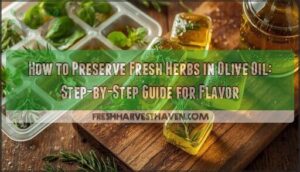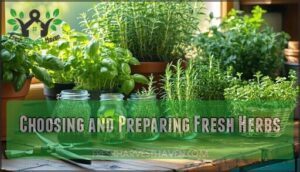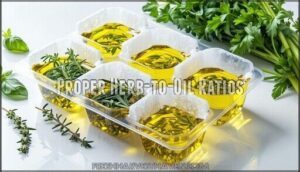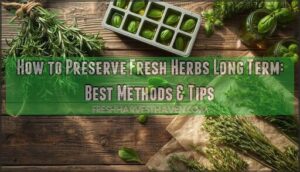This site is supported by our readers. We may earn a commission, at no cost to you, if you purchase through links.

Here’s the thing: preserving fresh herbs in olive oil stops that waste cold, literally. One afternoon of prep gives you months of ready-to-use flavor bombs sitting in your freezer. No more emergency grocery runs for a tablespoon of thyme. Just pop a cube into your pan and watch dinner transform from boring to superb.
Table Of Contents
- Key Takeaways
- Why Preserve Fresh Herbs in Olive Oil?
- Choosing and Preparing Fresh Herbs
- Selecting The Right Olive Oil
- Step-by-Step: Freezing Herbs in Olive Oil
- Safety Tips and Creative Uses
- Frequently Asked Questions (FAQs)
- Can I refreeze thawed herb oil cubes?
- How do frozen herbs compare to dried?
- Whats the best ice cube tray material?
- Can herb oil cubes be microwaved safely?
- Do frozen herbs work in fresh applications?
- Can you reuse olive oil after herbs expire?
- What temperature prevents herb cubes from melting accidentally?
- Do dried herbs work instead of fresh ones?
- How do you thaw frozen herb cubes quickly?
- Can you preserve herb stems along with leaves?
- Conclusion
Key Takeaways
- Preserving fresh herbs in olive oil through freezing extends their shelf life to 3-6 months while retaining 78-85% of aromatic compounds, eliminating the $1,500 Americans waste annually on spoiled produce.
- Hearty herbs like rosemary and thyme work best due to low moisture content, while tender herbs like basil and cilantro retain color and flavor when frozen, but all herbs must be completely dried before preservation to prevent botulism growth in oxygen-free oil environments.
- Extra virgin olive oil provides superior flavor and nutritional value compared to regular olive oil, and proper herb-to-oil ratios (two-thirds herbs, one-third oil) in ice cube trays create portion-controlled flavor bombs ready for immediate cooking use.
- Frozen herb-oil cubes can be added directly to hot pans without thawing, should be stored at 0°F in airtight containers with clear labeling, and should never be refrozen after thawing to maintain food safety and quality.
Why Preserve Fresh Herbs in Olive Oil?
Fresh herbs don’t last long, but locking them in olive oil can make their flavors stick around.
This method can save you time and keep your kitchen stocked with fresh tastes year-round. Here’s why using oil to preserve herbs is so handy.
Benefits for Flavor and Convenience
There’s something special about the way olive oil transforms fresh herbs, turning a handful of bright green leaves into a kitchen shortcut that’s bursting with flavor and ready when you’re.
With Herb Oil, you enable flavor enhancement, time saving, and ready availability for your meals.
Oil infusions foster culinary creativity, making herb preservation simple while cleverly reducing kitchen waste.
Extending Shelf Life of Herbs
Once you’ve tasted the punch that herb-infused oil brings to dinner, you’ll want to keep that garden-fresh magic lasting as long as possible. Preserving herbs in oil stretches shelf life far beyond wilting week-old bundles.
Unlike Drying Techniques or vinegar infusions, infused herb oils lock in bright flavor, giving you instant flavor enhancement every time you pop open your freezer.
Ideal Herbs for Oil Preservation
Not all fresh herbs fare equally well with oil preservation. Hearty herbs like rosemary, thyme, oregano, and sage work beautifully because their low moisture content and woody structure prevent spoilage while locking in up to 85% of aromatic compounds. Tender herbs—basil, parsley, cilantro, and chives—also freeze well in oil, with basil keeping its vivid green color and cilantro retaining nearly 78% of its natural oils. A great way to use these is by creating frozen herb cubes for later use.
Consider these factors when choosing:
- Moisture content: High-water herbs like mint and tarragon degrade quickly, forming water pockets that accelerate spoilage.
- Flavor retention: Common combinations like rosemary-thyme and basil-oregano maintain over 80% of their punch for months.
- Shelf stability: Hearty herbs last 3–4 months frozen; tender varieties stay bright for 2–3 months.
Herb preservation methods using oil infusions give you instant flavor enhancement, turning simple dishes into something special with basil dipping oil or custom blends.
Choosing and Preparing Fresh Herbs
Getting your herbs ready is just as important as the preservation method itself. The quality of your final product depends on how well you select, clean, and prepare your herbs before they meet the olive oil.
Let’s walk through each step to make sure your preserved herbs turn out flavorful and safe to use.
Selecting The Best Herbs for Freezing
Not all herbs freeze equally well, so choosing the right ones makes all the difference between vibrant flavor cubes and disappointing, soggy disappointments. Basil, parsley, cilantro, oregano, and thyme are your best bets for preserving peak freshness and bold flavor profiles.
These aromatic herbs hold up beautifully in oil, unlike delicate varieties that lose their texture. Pick herbs at their prime, before flowering, when their flavor infusion potential is strongest.
Washing and Thoroughly Drying Herbs
Getting your herbs squeaky clean and bone dry isn’t just a good idea—it’s the secret to preventing ice crystals and keeping botulism at bay. Here’s your game plan for fresh herbs ready for olive oil:
- Washing techniques: Swish herbs gently in cold water, removing dirt and contamination risks without bruising delicate leaves.
- Drying methods: Pat with clean towels or use a salad spinner to remove every drop of moisture—dampness invites spoilage.
- Equipment options: Air-dry on paper towels for 30 minutes, ensuring your culinary herbs are completely ready for flavor infusion.
Chopping and Portioning for Even Freezing
Once your herbs are clean and dry, cutting them into uniform pieces ensures they’ll freeze evenly and give you consistent flavor every time you cook. Herb size matters—finely chop delicate leaves like basil, coarsely chop woody herbs like rosemary.
Tool selection affects portion uniformity, so use a sharp knife for clean cuts. Density impact and thawing effects depend on consistent sizing, making your preserving techniques work perfectly with fresh herbs and olive oil for reliable food preservation.
Selecting The Right Olive Oil
The oil you choose matters just as much as the herbs themselves. Different olive oils bring different flavors, and quality plays a big role in both taste and safety.
Let’s look at what works best for preserving your fresh herbs.
Extra Virgin Vs. Regular Olive Oil
When you’re standing in the olive oil aisle, staring at bottles labeled "extra virgin" and "pure" or "light," you might wonder if it really matters which one you grab for freezing herbs. The short answer is yes, it does.
Extra virgin olive oil offers richer flavor profiles and higher nutritional value due to its cold-press production methods and lower acidity levels. Regular olive oil, with its higher smoke point and milder taste, works fine for preserving techniques, but you’ll sacrifice some depth.
For food preservation of fresh herbs, extra virgin delivers better taste when you’re ready to cook.
Flavor Pairings With Different Herbs
Think of matching herbs with olive oil like pairing wine with food—the right combination brings out the best in both, while a mismatch can leave you with a flat, disappointing result.
Here’s how herb synergy works in culinary combinations:
- Delicate herbs (basil, parsley, cilantro) shine with mild extra virgin olive oil, letting their aromatic profiles stay front and center in culinary applications.
- Assertive herbs (rosemary, thyme, sage) pair well with bold, peppery oils that complement their intense flavor profiles.
- Regional pairings work naturally—Italian herbs with Tuscan oil, Mediterranean oregano with Greek varieties create authentic culinary techniques.
Oil Quality and Food Safety Considerations
Quality oil isn’t just about flavor—it’s your first defense against food safety risks like botulism prevention and oil oxidation. Extra virgin oils with free acidity below 0.8% and peroxide values under 20 milliequivalents per kilogram resist degradation better during preserving. Lower acidity indicates higher quality oil with better flavor and shelf life.
For safe storage, acidify fresh herbs in a 3% citric acid solution for 24 hours before adding oil, lowering acidity levels that allow dangerous bacteria to thrive. Refrigerate these herb-oil combinations and use within four days, or freeze immediately for extended food preservation without compromising safety.
Step-by-Step: Freezing Herbs in Olive Oil
Freezing herbs in olive oil is easier than you might think, and it starts with a few simple steps. You’ll work with ice cube trays or molds to create perfectly portioned cubes that are ready when you need them.
Here’s how to fill, freeze, and store your herb-oil combinations so they stay fresh and flavorful for months.
Filling Ice Cube Trays or Molds
Ice cube trays aren’t just for water anymore, they’re your secret weapon for turning fresh herbs into ready-to-use flavor bombs that’ll save you time in the kitchen.
Here’s how to fill them like a pro:
- Choose silicone or metal trays – Tray material options matter for easy cube removal without cracking
- Fill each cavity loosely – Uniform herb distribution ensures balanced oil infusion for flavor in every cube
- Leave a quarter-inch at the top – Oil leak prevention starts with proper headspace during freezing
- Tap gently to release bubbles – This simple trick helps fresh herbs settle evenly for better preserving garden produce
These home food preservation techniques work beautifully with any herb variety, giving you restaurant-quality flavor whenever you need it.
Proper Herb-to-Oil Ratios
Getting the herb-to-oil ratio right is like hitting the perfect balance between too bland and too overpowering, and honestly, it’s easier than you might think. Fill each cube about two-thirds with chopped fresh herbs, then top with olive oil.
This herb density impact creates the perfect flavor intensity balance without reaching the oil saturation point. Adjust for strong herbs like rosemary or delicate ones like basil; your ratio adjustment factors depend on how you’re enhancing food flavors later.
Freezing and Storing for Maximum Freshness
Once your herb cubes are filled, pop the tray into the freezer and let them freeze solid for at least 4-6 hours, though overnight works even better. After freezing, transfer the cubes to airtight containers or freezer bags to prevent freezer burn and maintain flavor retention.
This long-term storage method keeps your fresh herbs preserved beautifully for up to six months, locking in their taste and aroma using simple freezing techniques that really work.
Labeling and Organizing Frozen Herb Cubes
After you’ve tucked those cubes safely into freezer bags, labeling becomes your best friend for avoiding the dreaded "mystery herb" moment three months down the road. Write the herb name, date frozen, and oil type on each storage container using permanent marker or freezer-safe labels.
Here’s what good labeling methods and inventory tracking bring you:
- No more guessing games – You’ll know exactly which fresh herbs you’re grabbing, making meal prep smooth and stress-free
- Track shelf life easily – Dating your food storage helps you use older cubes first, maximizing flavor before the six-month mark
- Perfect thawing techniques – Clear labels remind you what’s inside, so you can plan dishes that showcase each preserved herb beautifully
Smart freezing organization saves time and preserves quality.
Safety Tips and Creative Uses
Now that you’ve got your herb cubes ready, let’s talk about keeping them safe and getting the most out of them. There are a few important safety considerations to keep in mind, plus some clever ways to use these flavor-packed cubes in your everyday cooking.
Here’s what you need to know to store them properly and put them to work in your kitchen.
Preventing Botulism and Spoilage Risks
Botulism might sound like a distant threat, but it’s real when fresh herbs meet oil. Clostridium botulinum spores love oxygen-free, low-acid spaces, and herb-infused garlic oil creates the perfect setup for toxin production.
Food safety experts recommend drying herbs completely or using acidification methods before oil infusion. Freezing stops bacterial growth, making frozen herb cubes far safer than room-temperature storage.
Commercial processing uses pressure and controlled acidity, but home cooks should focus on quick use and cold storage to prevent food spoilage and botulism risks.
Avoiding Freezer Burn and Off-Flavors
Freezer burn sneaks up on even the best-preserved herbs, turning vibrant flavor into something dull and papery. Air exposure causes moisture loss, so you need solid packaging solutions like airtight containers or heavy-duty freezer bags. Temperature fluctuations open the door to ice crystals, which damage cell structure.
Olive oil acts like antioxidant additives, shielding herbs from oxidation during food storage. Blanching impact is minimal here, freezing works better for preserving methods that prioritize food safety and flavor retention.
How to Use Frozen Herb-Oil Cubes in Cooking
Drop one of those frozen herb cubes straight into your hot pan, and you’ve got instant flavor without fumbling through jars or chopping boards. Toss them into sautés, soups, or roasted vegetables while still frozen, no thawing methods needed.
Flavor combinations shine in pasta, marinades, and stir-fries. Recipe adaptation becomes simple, you’re preserving fresh taste while exploring new cooking applications. These preserving methods turn everyday recipes into something memorable.
Storage Duration and Best Practices
For maximum food preservation, your herb-oil cubes stay fresh up to six months in the freezer. Keep freezer temperature at 0°F or below, and focus on container sealing—airtight bags or silicone trays prevent freezer burn and spoilage indicators like off-odors.
Practice usage rotation by labeling batches with dates, using older cubes first. Remove only what you need, skip refreezing after thawing methods, and watch for discoloration to maintain food safety guidelines while extending shelf life.
Frequently Asked Questions (FAQs)
Can I refreeze thawed herb oil cubes?
Refreezing safety isn’t recommended once thawed herb oil cubes warm to room temperature. Oil quality degrades, flavor changes occur, and texture impact becomes noticeable with repeated freeze-thaw cycles.
Best practices for food preservation and food storage suggest using thawed cubes immediately, as freezing food multiple times compromises both taste and safety when preserving herbs.
How do frozen herbs compare to dried?
Frozen herbs retain more flavor intensity and nutrient retention than dried herbs, though texture changes occur. They’re better for fresh herb recipes and cooking, while dried herbs cost less and suit food storage long-term. Freezing preserves bright color and taste brilliantly.
Whats the best ice cube tray material?
Silicone trays win for preserving fresh herbs in olive oil—they’re flexible, durable, and eco-friendly. Plastic works but may absorb flavors over time.
Choose BPA-free options for tray material safety and better food preservation results.
Can herb oil cubes be microwaved safely?
Yes, you can microwave herb oil cubes safely, but oil temperature spikes fast and unevenly.
For better nutrient retention and flavor impact with your homemade condiments, alternative thawing works best—drop the frozen cube straight into your hot pan instead.
Do frozen herbs work in fresh applications?
Unfortunately, frozen herbs don’t work well in fresh applications like garnishes or salads because freezing food changes their texture. However, they’re perfect for cooked dishes, where flavor impact matters most.
Nutrient retention stays high, and homemade condiments benefit greatly from this food preservation method.
Can you reuse olive oil after herbs expire?
Many people don’t realize that botulism risk increases considerably when reusing oil from expired herbs. No, you shouldn’t reuse olive oil after herbs expire; herb decomposition creates food safety hazards.
Instead, make herb salts using fresh herbs or dried herbs for safer reusing methods.
What temperature prevents herb cubes from melting accidentally?
Keep your herb cubes solid by storing them at 0°F or below, the standard freezer temperature.
Oil composition affects melting point, but consistent freezing prevents thawing effects and keeps your preserved herbs ready for cooking.
Do dried herbs work instead of fresh ones?
Dried herbs won’t give you the same results when preserving in olive oil. Fresh herbs deliver better flavor intensity and texture differences compared to their dried counterparts.
If substituting, adjust your recipe ratios carefully, using less dried herb salt.
How do you thaw frozen herb cubes quickly?
You don’t need to wait for room temperature thawing. Toss frozen herb cubes directly into hot pans, soups, or sauces while cooking—the heat melts them instantly, releasing flavor without extra steps or microwave thawing.
Can you preserve herb stems along with leaves?
Tender stems pack a punch of flavor, but tougher woody ones? Not so much.
For preserving herbs in olive oil, stick with soft stems from parsley, cilantro, or dill—they blend right in. Remove thick, fibrous stems from rosemary or thyme first.
Conclusion
Your freezer just became the most valuable real estate in your kitchen. Those herb-oil cubes you’re stashing away? They’re worth their weight in gold when you’re racing against dinnertime.
Preserving fresh herbs in olive oil transforms your cooking from scrambling for ingredients to simply reaching into your freezer with confidence. You’ve mastered a technique that professional chefs swear by, one that saves money, eliminates waste, and delivers restaurant-quality flavor in seconds.
Your future self will thank you every single time.
- http://www.getfresh23.com/
- https://www.anrdoezrs.net/links/8834312/type/dlg/https://www.vitacost.com/nutiva-organic-virgin-coconut-oil-1-gallon
- https://www.buzzsprout.com/469465/1751242
- https://gardenerbible.com/how-to-preserve-herbs-in-oil/
- https://bhooc.com/blogs/articles/botulism-risks-in-infused-oils-what-to-know










